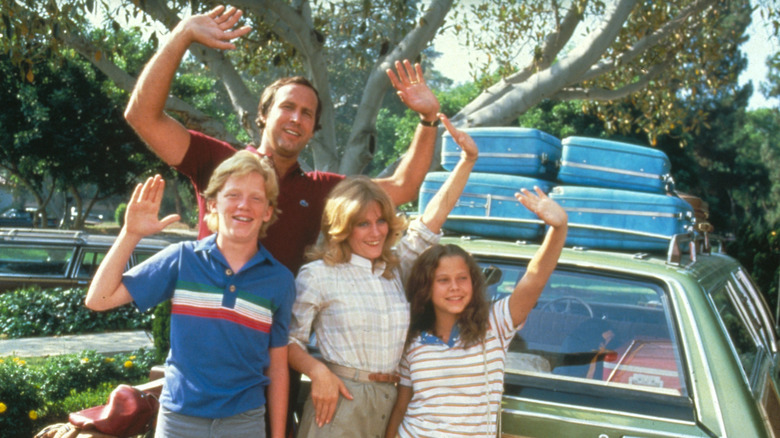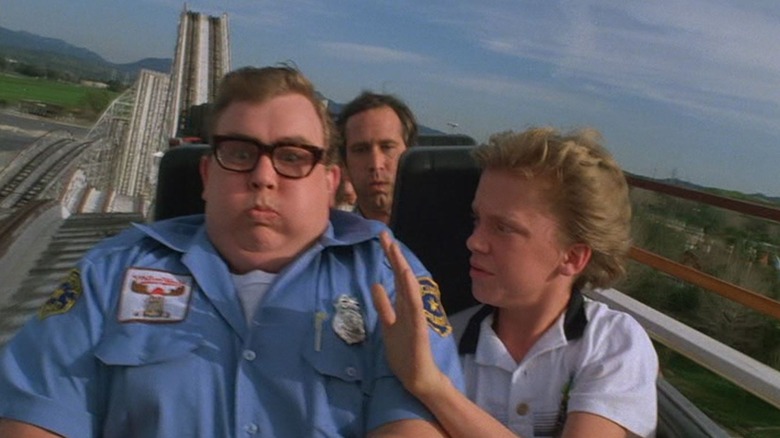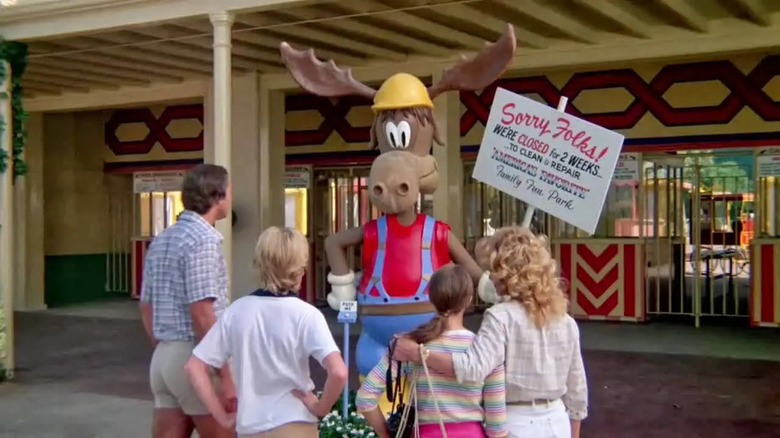Shooting An Entirely New Ending For National Lampoon's Vacation (Literally) Nauseated Chevy Chase
Movies can and should be considered living, breathing entities. At least in the sense that they grow, change, and adapt based on their surroundings. What a screenplay looks like on paper at the beginning is rarely the same thing as the finished product. Even when a film is finished, many movies are screened for test audiences. If the filmmaker or studio doesn't like the feedback received from those screenings, a film might be cut down, re-edited, or even re-shot. Such was the case for "National Lampoon's Vacation."
Today the film stands as a beloved John Hughes movie and the hit that led to a quartet of films starring Chevy Chase, Beverly D'Angelo, and various Griswold family cast members. The road trip movie featuring the "Family Truckster" station wagon that half our fathers seemingly owned in the early 1980s hit home for a lot of Gen X'ers with families being ripped apart by divorce. Perhaps that's why the Griswolds resonated with us so much. As dysfunctional as they were at times, we still wanted to be them.
But before the series became a comedy staple of the 1980s, the origin film needed a substantial reshoot after a disastrous test screening. According to director Harold Ramis, test audiences were laughing hysterically for most of the film, and then the laughs simply stopped. The response prompted changes to the film's ending that would leave Chevy Chase sick to his stomach.
They rode roller coasters 'over and over'
The original version of "National Lampoon's Vacation" looked very different from the one we know and love today. In the book "Wild and Crazy Guys: How the Comedy Mavericks of the '80s Changed Hollywood Forever" author Nick de Semlyen explains what happened with the original cut. The author writes:
"Also cut: the entire original ending, in which Clark arrives at the amusement park (no longer Disneyland, but the fictional Walley World) to find it is temporarily closed, causing him to fly into a rage and take the park's creator hostage in his own home."
In the DVD commentary of the film, director Harold Ramis explained further. "We had to re-think the whole end of the movie," the director said. Writer John Hughes came up with a new ending to the film where Clark forces a security guard (John Candy) to open the park. The new scenes were shot over the span of three days at Six Flags Magic Mountain in Valencia, California. And the new ending literally made Chevy Chase sick.
Much of the new footage involved the Griswolds on a roller coaster. "The reshoot was less fortuitous for Chase, who became nauseated after having to ride a roller coaster over and over again," Semlyen wrote.
While the re-shoots left Chevy Chase nauseous, they might have also saved the movie.
The original ending was much darker
Much like in the final cut of the film, the version shown to test audiences has the Griswolds arriving in California to find Walley World closed. That's where the original goes in a different direction. In the DVD commentary, Ramis explained in detail what the original ending looked like. The director said:
"Chevy just snaps and decides to go to Roy Walley's house. ... So we shot this whole sequence with Roy Walley and some executives, Chevy takes them prisoner with a pellet gun he's bought, and makes them sing and dance for him because he wants his dime's worth of entertainment."
It's no wonder that audiences didn't like the original ending. No Walley World, no John Candy as the hapless security guard, and a very different interaction with Roy Walley. Not only that, but it also paints a very different picture of Clark Griswold.
This darker ending depicts Clark as a bitter madman rather than the loveable yet frustrated family man who's willing to do anything to show his family a good time. It contradicts the affable, classic 1980s Boomer dad we fall in love with on the Griswolds' cross-country trip from Illinois to California.
Several movies later, Clark ironically asks his son, "Russ, when was the last time I overdid anything?" But even this original ending to "Vacation" was too much for Clark. With apologies to Chevy Chase, we agree with Harold Ramis when he said, "The re-think saved the picture in a big way."
More than that, it might have saved an entire franchise. And for that, we thank you, humble 1983 test audience.


